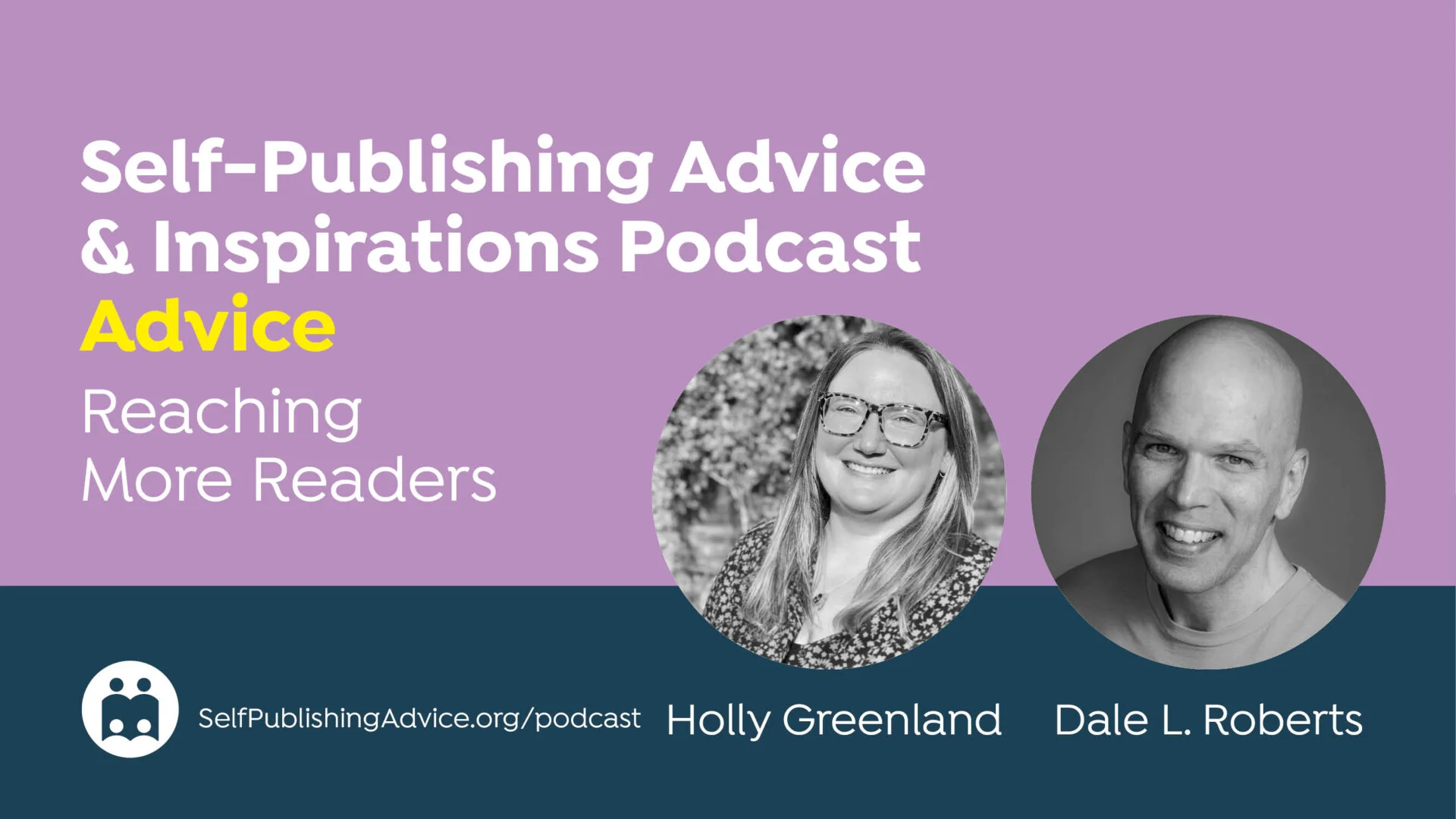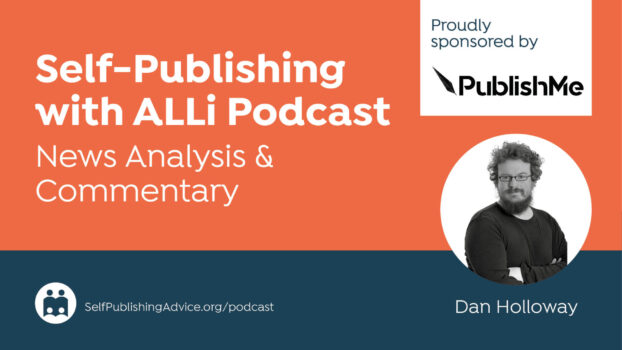This month on the Reaching More Readers podcast, Dale L. Roberts and Holly Greenland demystify book genre category selection, share tips for picking the right categories to increase your book findability, and offer a quick reminder of the new Amazon category selection process.
Find more author advice, tips, and tools at our self-publishing advice center. And, if you haven’t already, we invite you to join our organization and become a self-publishing ally.
Now, go write and publish!
Listen to the Podcast: Genre Category Selection
This month on the Reaching More Readers podcast, @selfpubwithdale and Holly Greenland demystify book genre category selection. Share on XDon't Miss an #AskALLi Broadcast
Subscribe to our Ask ALLi podcast on iTunes, Stitcher, Player.FM, Overcast, Pocket Casts, Spotify or via our RSS feed:
About the Hosts

Dale L Roberts
Dale L. Roberts is a self-publishing advocate, award-winning author, and video content creator. Dale’s inherent passion for life fuels his self-publishing advocacy both in print and online. After publishing over 50 titles and becoming an international bestselling author on Amazon, Dale started his YouTube channel, Self-Publishing with Dale. Selected by Feedspot and LA Weekly as one of the best sources in self-publishing of 2022, Dale cemented his position as the indie-author community's go-to authority. You can find Dale on his website or YouTube

Holly Greenland
Holly Greenland is a self-published author, content writer and strategic communications consultant. She has worked in marketing and communications for nearly twenty years, including at the BBC, UK Parliament, and award-winning agency Social & Local. Holly is currently completing a Publishing PhD with Kingston University in London, investigating the factors that increase the likelihood of indie author success. Find out more about Holly's writing on her website or connect on LinkedIn.
Read the Transcripts: Genre Category Selection
Dale L. Roberts: With the overwhelming options for marketing and promoting a book, what can indie authors do to get their books into more readers hands? We explore the many facets of book marketing in this new monthly podcast, Reach More Readers, brought to you by the fine folks over at the Alliance of Independent Authors.
I'm Dale, first of all, Dale Roberts. I am an award-winning author and also, that bald headed guy who talks entirely too much about self-publishing over on YouTube, you might recognize me, and this is my co-host, Holly.
Holly, share a little bit about yourself.
Holly Greenland: Hello. I'm a marketing and comms strategist. I've worked in marketing for about 20 years. I'm a freelance writer and I've self-published a couple of books and I'm now working with the Alliance of Independent Authors on their weekly blog, which is really fascinating and, of course, this podcast. Oh, and I should say, I'm doing my PhD. I always forget it every time, I'm doing a PhD looking at self-publishing.
Dale L. Roberts: You've got to flex that, because honestly, I'm the guy that obsesses about things on YouTube. Whereas I feel like you've got the more credible avenue here for us to explore.
Now, speaking of, you actually brought up today's topic, and you actually mentioned this, and I just about lost my mind because what we're going to discuss is a very important marketing tool, and that is where you place your book, the categories that you select.
Because the categories you select based on, whether it's Amazon or you're doing Kobo or IngramSpark or wherever you're distributing, makes all the difference for discoverability.
Because if you're not selecting the right categories for your book, it's going to get put into the wrong shelf, and it's going to get recommended to the wrong readers, and therefore you're going to mire in obscurity down in the bargain basement DVDs with Steven Seagal's cheap movies, and we don't want that.
Holly Greenland: No. Actually, I found it really scary when I was first putting up my first book. It's a cosy mystery. I went in there, and I was like, what is the category? What's the right one? What are people searching under? And then the subcategories, it's British, it's also a female sleuth.
You're trying to shift between things and work out how people are going to find them. I find it quite scary. I'm hoping I'm going to learn a lot from you today, Dale.
Dale L. Roberts: It can be very overwhelming at first because you're so deep in the thick of it, that you're like, okay, my book is this, but it's also this, but it's also this.
Sometimes we have to distil down what it is our book primarily covers, and that's the most important thing when it comes to category selection and putting yourself on the right bookshelf.
So, what I would say as the very first thing, is regardless of the avenue that you choose, you should already be familiar with other authors and books that are within or around your genre.
For instance, I am a horror writer. I enjoy writing horror. I love Stephen King, Dean Koontz, Jonathan Mayberry, a big shout out to Jonathan Mayberry, love him. Gosh, there's so many other ones. So, I Automatically know this, but I do know there are some authors out there that are super creative and they're genre bending, if you will, but that can lead to some real heartache if you don't really anchor down what it is.
So, for instance, what is your one book about, Holly?
Holly Greenland: Okay. So, my murder mystery, you mean? It's a cosy mystery. It's set around new mothers. It's British, set in London, and there's essentially a series of murders that two women who are on maternity leave with their babies try and unravel.
So, that's the basics. So, where do I place it? So, I would say cosy mystery.
Dale L. Roberts: Okay. What are some similar authors to what you're doing?
Holly Greenland: This is an interesting one as well. I was really inspired by, I absolutely love Agatha Christie, so I was totally inspired by Agatha Christie, but I also recognize it's not very much like Agatha Christie. So, I would say probably more people like Claire Chase, maybe even slightly going down the L.J. Ross kind of direction, maybe slightly lighter. It's in that kind of area.
Dale L. Roberts: Got you. So, you sound like you have a fair grasp on where that's going to go.
So, I want everybody to put yourself in a position of being in a library, and when you're going into that library, where are you going to find your book? Where are you going to walk to and find it in that section? No one's going to be upset if your books are probably placed near Agatha Christie's books, am I right? They're probably not going to be angry.
It's mystery. Sure, it may not be the same writing style, but we're still in the same genre. I think it's so important though, that you do know that really nailing down that direction even more, or as we call it, ” niching down”.
Niching, meaning a niche, being a genre, a type of book.
Getting it down to the lowest common denominator is going to be the thing that's going to help you become more discoverable.
Now for the sake of keeping this podcast less than two hours long, I could probably explore all of the different categorization systems across each of those different platforms, but for the sake of brevity, why don't we just focus on the 10-ton pink gorilla in the room known as Amazon KDP?
You're allowed to select up to three categories for each of your publications. It used to be that you could do two BISAC categories and then they would throw you into whatever fit at best and then you could request an extra up to 10 categories. That's no longer the case. They got sick of doing that, I think, over at KDP.
Holly Greenland: It was by email, wasn't it? I think you had to email in and wow, a big process. Okay. So, it's three. Yep.
Dale L. Roberts: It's three, and you could only choose your primary marketplace. That's my biggest beef sometimes right now is the fact that you can't change anything outside your primary marketplace.
So, for instance, Holly, your primary marketplace is probably UK, am I correct?
So, the biggest problem is if you want to change anything in the US or Canada or Australia, or any other of the different regions through KDP, you just can't do that. You have to trust Amazon to place it in the right categories, and here's how they do it. They do it based on the categories you select in your primary marketplace and the keywords you select as well as the basic type of content that you have.
So, for instance, if you had a particularly short read, something that would be two hours or less of reading, you might get categorized into a short reads category based on the keywords and the categories that you've selected.
Now, you can't select those short read categories, only KDP are able to do that, unless something has changed drastically recently.
So, with those three categories, you don't have to choose all three of those, but choose at least one. Getting yourself into three categories, yes, will aid in discoverability, but one of the things that they had discovered, and this was something that they'd revealed on their KDP support page, was actually having above three categories confused the Amazon algorithm.
It was like, oh gosh, you got these 10 different ones. So, what they found was less is more for discoverability. Sure, you've really niched down and you got really far down when you had 10 different categories, but it confused this search engine algorithm. So, that's why I say get really good on one, two, if not three of those categories, you don't want to go beyond that, and obviously you can't do it at this point.
But here's where the complexity happens, and this is where it's going to just blow people's minds if you haven't been in the know about this. Have you been aware of what Dave Chesson and the Kindlepreneur uncovered about categories more recently?
Holly Greenland: Oh, no, I don't think so.
Dale L. Roberts: Okay. So, this is a very interesting one and I highly recommend folks go check out the Kinepreneur's article about this one. Apparently over 50 percent of categories that they offer to you inside your KDP dashboard are duplicates. It will look different in the browse path.
So, the browse path, this is how it works. So, typically, we'll say it's Kindle store, and then it breaks down to business and in finance, and then it breaks down into instructional or reference, and then it breaks down. That's a browse path. We're able to break those browse paths down when we select the three different categories inside our books.
50%. I think it was actually 54 percent to be exact. That's not such a bad thing. It really isn't, because you're going to actually have placement in many other different categories because I think it breaks out to category, subcategory and placement on Amazon. So, category would be like a broad, all-encompassing zone.
So, yours would probably be something like mystery, and then it starts to drill further down to a subcategory, which your subcategory would probably cosy mystery, and then placement would be something down below that. It's all those different layers of complexity that a lot of people are unaware, they're like, oh, this placement makes sense because this is what my book, and then all of a sudden, you're choosing a duplicate.
Again, it's not going to work against you because all those category, subcategory and placement are slightly different along the way. So, this means that you're going to be shelved in various aspects, even though you've only chosen one category, you're being put into numerous other categories, subcategories, and placement areas.
So, they say placement categories, but that's a little redundant. You get what I mean so far?
Holly Greenland: Yep, I do, and you mentioned about keywords as well. So, is it important?
Because I think when I was looking at this a little while ago for a different thing, it was that the keywords need to back up your category choices to reiterate to Amazon that you've picked the right places, you're in the right place. Is that how it works?
Dale L. Roberts: Yes, and this is nothing that they have come out and directly said. I do know this was another part of the whole Kindlepreneur case study that they had broken out this whole duplicate category situation.
KDP has the right to reject a category selection that you have, and it's going to be based on, of course, your content, but to a large part, your metadata, which will include, of course, your title, subtitle, series name, author name, and your keyword selection, your back-end keywords.
If those keywords don't align with that category selection, they could push back and say, we're not going to put you there. Now, I haven't heard of anybody having their account terminated or anything else like that for selecting the wrong category, I only understand that they just will reject it and just put the thing to draft and say, select the right one, this isn't going to do it. But beyond that, you're not going to get beat up.
Now, there were some horror stories prior to this about improper category selection. Now this is, I love this term, big shout out to David Gaughrin, love his content. David actually, I think, called it category squatting, where some people would put themselves into a category that they saw was not very competitive because they wanted to get a best seller tag.
Come on, folks. If you are doing, let's say, I don't know, a steamy romance, placing it into a car instruction manual category and making one sale to become a best seller category, it's not cool. It's not cool at all. So, that is where KDP does take umbrage, that they will start to shut down accounts or even penalize you in some capacity.
Holly Greenland: So, people shouldn't be scared about going in and putting the keywords in that they think are appropriate. Don't be freaked out by it, but it is a backup for them for when people are deliberately trying to get around the system, presumably trying to get that bestseller tag by cheating the system, and that's not cool.
Dale L. Roberts: Yeah, and by the way, folks, the bestseller tag, I've busted this myth a long time ago. Yes, it's cool to get the bestseller tag. It's fantastic. Especially, one of my books got to the top 3000 a number of times. Love that feeling. That's fantastic. 3000 overall. Now, there's nothing like top 100 as some authors that I've known, but this is great. But I'm going to tell you, this is the reality of the situation. If you're trying to just select a category, just to become a bestseller.
My wife said to me the very first time I became a bestselling author; this was early 2016. I was so excited. I was elated. I sold dozens of copies within a day, actually 80 some plus copies or whatever, and she said, great, do you get paid more?
I was like no, but I can call myself a bestseller author, best-selling author.
And she's like, well, will that get you paid more?
Maybe it'll get me some speaking gigs.
Until it pays you more, don't sweat that type of stuff. It's not going to pay the bills.
I'm not trying to discourage anybody from finding the right category to place your book into that is appropriate and becoming a bestseller there, but don't do it by circumventing the system and selecting a category that has nothing to do with it.
You'll know if your book is appropriate for a category, because if you doubt, throw it out. That's it. If you got doubt, throw it out because it does not make sense.
So, for you, Holly, placing your cosy mystery over into steamy romance categories doesn't make sense. That'd be highly competitive, that would be silly for you to put it there. But nonetheless, just to illustrate a point of putting in the wrong area, you should be able to know.
Now, here's the part to really figure out where you should be going is find that category on the Amazon marketplace. Look at the other books. This is what I'll do is I'll screenshot all the best sellers, and then I will take my book cover, and of course I have to place it in the number one spot because I'm just a narcissist.
I place it on over there and I compare it and I say, does this make sense?
You don't even have to do a screenshot if you don't want to. You can literally be able to look at the best sellers and say, do I belong here, and if you don't belong here, that shouldn't be a category you select.
Holly Greenland: That's a great idea anyway, just for looking at your cover. So, you could do the whole thing probably, couldn't you, if you're doing a categorization, because if you're looking at it and thinking, it should belong here, but it doesn't look like it should, you've probably got some other questions about your marketing and your branding. But yeah, that's a great idea.
Okay. So, would it sit correctly in that category and also good motivation to imagine it at number one.
Dale L. Roberts: It is. All joking aside of the self-deprecation here, it is actually a very good tool to see how you measure up.
It's also a great way to see, of course, as you said, how your cover matches the others. You want to see that it's genre specific. I think that's what a lot of authors get wrong, and I get a lot of folks that comment on my videos or reach out to me via DMS or emails, and they're just like, I'm not selling any books, I don't understand.
Then I go look at their book cover and, Oh good Lord, no. Or they'll have an awesome cover, but it's not genre specific, because you have to really see what's performing really well for your genre today.
But I don't want to get too far down that path. I want to just step back just a little bit, because there's a little bit more to the article that Kindlepreneur had put out, and that was ghost categories.
Now this is the part that's most concerning, and this is not my way to try to sell more Publisher Rocket licenses or anything else like that, but let's walk it back.
There are categories, and I think it was over 26 or 27 percent, my percentages might be off. We'll probably have to give a link to our podcast producer to put it inside the show notes so they can actually review this Kindlepreneur article, so that way listeners can be able to see what I'm talking about.
But the ghost categories are essentially categories that just don't exist. You're selecting categories in your dashboard, they're not even on Amazon. Now it will populate, it'll be there. You'll see other books there, but you will never get a bestseller tag on that, and it really does arguably become less discoverable by having these ghost categories.
I reached out to the KDP team, and they gave me a firm no comment. I had asked about the ghost categories. I was like, what's the deal with this, and they're like, sorry, we can't comment on that. So, I wonder if there's something that's coming out relatively soon.
Now, how do you know if you're inside a ghost category? Unfortunately, you don't, you really don't.
It's probably going into your product details once your book has launched and you've sold a good handful of them, you'll be able to click inside the product details on your category to take you to the bestseller page. But in a lot of instances, you won't be able to sort that out unless you have something like the Publisher Rocket tool, which does category and keyword research as well as Amazon advertising.
I'm not going to sit here and try to shill on this one. I love it, I bought it a long time ago. It was fantastic, it served me well, but in the interest of being neutral here in the Alliance of Independent Authors, I would say probably the best thing to do to not select a ghost category, is look at the other books that are within your genre. See what they're doing. There's even a free website that will help you spy on your competition.
I hate using the word spy, because it's not really spying per se, but it's called bklnk.com, and it's free. You just go over to that site, you take the ASIN, that is the product number that Amazon assigns a book, and you drop it into their search tool for categories and it will pop up all the categories that book appears within. Then you can be able to see, oh, this category is real.
Because again, we don't have to worry so much about duplicate categories. Sure, we'd like to cast a wider net, but everybody can agree, we don't want to go into categories that don't exist, which is just mind boggling. It just drives me absolutely crazy.
But Holly, the one thing that I want to implore on you is, and also other listeners is, don't get too scared about this.
Select the categories that make the most sense for your book and everything else will sort itself out. Putting yourself in the right category makes all the bit of difference of marketing your book properly. So that way, it's hanging out with other books that are like it, because here's the cool thing, when somebody purchases your book within a given category and that book is similar to your book, different companies, primarily Amazon, will recommend your book to the readers that bought that other book. So, that's why category placement is absolutely important, but it's not so much so that you need to lose sleep over it.
Holly Greenland: So, you just need to use common sense. It's not a big trick, use common sense and do a bit of research against your competitors. That's really useful.
So, I know that with ALLi, we are always saying, make sure ideally that you're going wide because there's a lot of benefits of doing that.
Is this a similar technique in terms of looking across the other platforms? Because obviously Amazon is the big one, particularly because there's been some changes, but are there other things to think about when we're looking across the other platforms?
Dale L. Roberts: Most of the other platforms honour the BISAC system, which is the book industry standards and communications codes, and that is used in the US and UK primarily, but it seems like mostly a universal system. It's going to be a little easier. You're not going to go into Ingram spark and select a category, not expect to be placed in the appropriate category to wherever they distribute to.
Same thing with something like Draft2Digital. You're going to select those particular BISAC categories. It's going to aggregate you out, or excuse me, propagate you over to those particular categories for wherever you're distributing to.
So, it's a little less problematic, but I would recommend that if you do distribute to a specific category or through a specific avenue to a specific category, that you double check your product page to make sure that it makes sense, because then you'll go into your product details and see exactly where that category is and then look at the other books that are within there and then adjust accordingly.
Holly Greenland: Okay, that's really useful. I feel less scared.
Dale L. Roberts: Yes, we got all the way through 20 minutes really easily and you summarized it really good. Someone's probably listening to this and going, common sense, why didn't Dale say that originally?
Here's the thing, I was taught this a long time ago in direct sales, and my mentor at the time used to say that common sense isn't always common practice. Common sense isn't always common practice, and this is why I like to break down these nerdy elements, so that way people can understand and go, Oh of course it's that. It's common sense, but sometimes when push comes to shove, they're overwhelmed by all these different things and this other advice and oh, I want to become a number one bestseller, so I better go ahead and put my werebear shapeshifter romance over into car manuals.
Yeah, that's probably not a good idea, but give us a real quick summary here, Holly, as we wrap up today's little episode.
Holly Greenland: I guess common sense is the big thing for categories, I think. I think that's what I'm going to take away.
Go in, think about where you sit, think about how it feels for the audience. I mean, we always go back to that. How is your audience going to find you and what does it mean for them, and use your common sense. There's no big trick. I think that helps with the overwhelm, actually. There is no big trick, you're not missing something, common sense, and give it a go.
And also, you can always change them, right?
So, if you get further along the line, you can make a change.
Dale L. Roberts: For sure.
We're going to go ahead and start to wrap up today's episode. I want to thank each and every single one of you for tuning in, and if you're listening to this on your preferred podcasting platform, do us a favour and hit follow of the Alliance of Independent Authors.
We're going to be here every month to talk more about marketing through the Reach More Readers podcast segment. On behalf of Holly here, this is Dale, and we want to thank you for tuning in.





